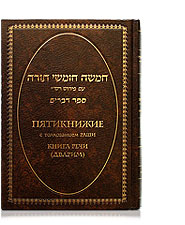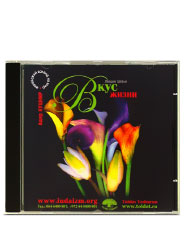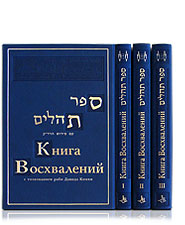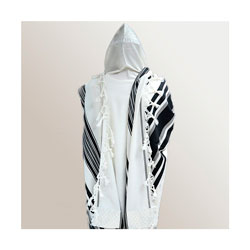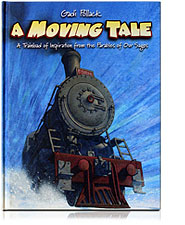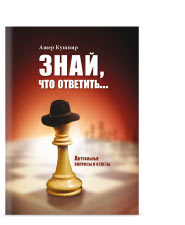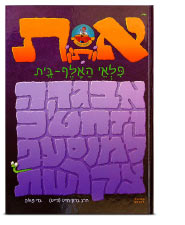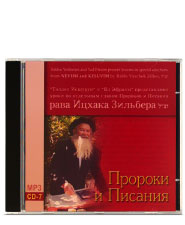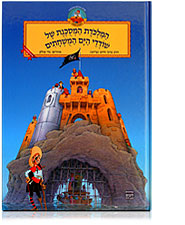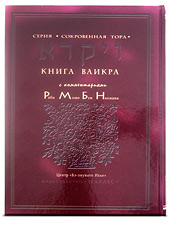
Restore Torah to Russian-Speaking Jews!
Fifteen years ago, Avraham Cohen was a savvy filmmaker in downtown Moscow...
Fifteen years ago, Avraham Cohen was a savvy filmmaker in downtown Moscow. He had it all—an elegant studio apartment, a respectable salary, anything that money could buy. But there are certain things that even money can’t buy, and the void in Avraham’s heart grew larger with each passing day. Raised in the embrace of a warm, loving family that had immigrated to the United States after the fall of the Iron Curtain, Avraham longed for the security and comfort of his own home.
The secular women in the Moscow film industry repelled him. He knew that he was searching for something different, something more…pure, more authentic. Cohen began seeking a framework where he could find such a partner. A friend dragged him to a class on Judaism, and within short time, he was hooked.
As always, Harav Yitzchak Zilber, zt”l, the father of the Russian teshuvah movement, visited Moscow that Pesach. Born in Kazan, Russia, shortly before the Russian Revolution in 1917 to a venerated Rabbinical family, Rav Zilber displayed extraordinary mesirus nefesh throughout his life in teaching Torah to masses of Jews living in the former Soviet Union, organizing thousands of brisos and helping Jews observe Shabbos. Even when he was imprisoned in Stalin’ gulag for the “crime” of remaining an observant Jew and teaching Torah to others, he never once violated Shabbos or other mitzvos. The Zilber family attempted to immigrate to Israel for years but they were refused, only receiving permission in 1972.
Upon his arrival in Israel, Rav Zilber was appalled to discover that the vast majority of Russian-speaking Jews were not observant, and for the most part entirely ignorant of their heritage. He undertook to rectify the situation and began teaching extensively throughout the country.
After the fall of the Iron Curtain and the mass Russian immigration, he quadrupled his efforts, investing countless hours teaching Torah, arranging circumcisions, and helping Russian agunos obtain gittin. He made himself available to everyone who sought his advice, earning the well-deserved title “Father of Russian Jewry” and teacher of all contemporary Russian-speaking Roshei Yeshivos and maggidei shiurim. Harav Yosef Sholom Elyashiv, shlit”a, described Rav Zilber as one of the lamed-vav tzaddikim who sustain the world.
That year, Avraham Cohen offered to greet Rabbi Zilber at the airport and was immediately overcome by the purity and honesty that radiated from his countenance. Ultimately, he became his permanent driver whenever Rav Zilber visited Moscow for the chagim.
The years passed by. Avraham, now thirty years old, was no closer to finding his predestined one. The pain and loneliness were all-encompassing. As he bid goodbye to his mentor after one trip, Rav Zilber turned to him with kind eyes and said “Avraham, the time has come for you to leave Moscow. Come to Eretz Yisrael, the land of our forefathers. I promise that you’ll be married within the year.”
Avraham Cohen needed no further prompting. One month later, he was on an El-Al flight to Tel Aviv. That was over a decade ago, when Avraham had just started his journey along the path to Torah and mitzvos. Today, Rabbi Avraham Cohen, a father of many children and author of a book about Rav Yitzchak Zilber, is executive director of Toldos Yeshurun.
Initially, Cohen learned full-time in a yeshivah for baalei teshuvah. Shortly after his marriage, Rav Zilber encouraged him to host shiurim for Russian-speaking Jews in his Bayit Vegan home. The group began with four dedicated avreichim but quickly expanded, until Rabbi Cohen began encouraging others to open their homes as well. The fascinating variety of shiurim for Russian-speaking men and women was a great success, and requests began cropping up throughout the country for similar shiurim.
In the year 2000, with the blessing of Rav Zilber and his son Rav Benzion Zilber, Avraham Cohen helped found Toldos Yeshurun, a nonprofit organization for Russian-speaking religious Jewry. The organization’s dual objective was to draw Russian Jews to Judaism and unite them within a social and religious infrastructure through the creation of an educational Torah network, at the same time helping them acclimate to mainstream Israeli society.
“Yeshurun is Klal Yisrael’s name at the end of days, and we are now experiencing the era of Mashiach,” explains Rabbi Cohen. “The word toldos is a reference to history, ancestors, generations. At Toldos Yeshurun, we are bridging the gap between our sacred past in Russia—which was once home to millions of righteous, pious Yidden—and our future—the days of Moshiach.”
Today, nearly a decade after its establishment, Toldos Yeshurun combines the efforts of over 350 rabbis and teachers, the majority of whom are young, energetic, ambitious Russian-speaking bnei Torah who have studied in distinguished yeshivos in the United States or Israel.
Thirty evening kollelim and 65 shiurim sites extend throughout the country, from Haifa in the North to Ofakim and Beer Sheva in the South. Nearly every large city in the country boasts a kollel or shiur for Russian-speakers. Over 2,000 Russians participate in Toldos Yeshurun kollelim and shiurim.
Undoubtedly, Toldos Yeshurun’s keystone project is its Yeshiva. The Toldos Yeshurun Yeshiva, spearheaded by Rav Yitzchak Zilber’s only son, Rav Bentzion Zilber – a talmid of Harav Chaim Shmuelevitz, president of Toldos Yeshurun, and the greatest Russian-speaking contemporary halachic authority in the world – produces authentic Russian-speaking Bnei Torah and talmidei chachamim who can relay the tradition of their ancestors to their fellow Russian-speakers. Situated in central Jerusalem opposite the Mirrer Yeshiva, Toldos Yeshurun Yeshiva offers a special program geared to Russian-speaking young men ages 15 to 25. The Yeshiva accepts talented bachurim at all levels of learning; some may have discovered their Jewish roots only months before arriving, others may have attended Torah institutions for a number of years.
The Yeshiva provides a warm, friendly environment for 40 young men who come from a variety of countries in the former Soviet Republics – Russia, Ukraine, Georgia, Belarus – and even some from Germany or the United States. Students also learn with chavrusos from the Mirrer Yeshiva, who help them acclimate to mainstream religious life and Torah study in Israel.
“The goal of the program is to help students like me become firmly entrenched in our Jewish roots, while preparing us for a lifetime of spiritual growth,” says Dovid, a student at Toldos Yerushun.
Bachurim who graduate from the yeshivah maintain close contact with other alumni and teachers, thus forming a cohesive support network of Russian-speakers. The most elite students often go on to learn or teach in Toldos Yeshurun kollelim throughout the country and are mainstreamed into some of the most distinguished Hebrew-speaking kollelim in Eretz Yisrael.
Still, Toldos Yeshurun’s pride and joy is the Sanhedria Murchevet Halacha Kollel, established four and a half years ago by Rav Bentzion Zilber in memory of his venerated father, zt”l. The full-day Sanhedria Murchevet Kollel is led by Rav Zilber’s only son, Rabbi Benzion Zilber, a talmid of Rav Chaim Shmuelevitz, president of Toldos Yeshurun and the greatest Russian-speaking contemporary Halachic authority in the world. The rigorous kollel, which currently has 20 memebers, accepts only the most diligent, brilliant Russian-speaking avreichim into its fold. Its goal is to perpetuate Rav Yitzchak Zilber’s life-long dream of restoring the Torah of Russian Jewry to its former glory.
The Rosh Kollel is Harav Moshe Petrower, a close disciple of Harav Shmuel Auerbach, and a man with extensive experience in molding fine avreichim into talmidei chachamim.
“The greatest dilemma of the Russian-speaking religious community is its lack of qualified Rabbanim. We have hundreds of avreichim, but they lack the leadership of brilliant Rabbanim. The goal of our Halacha Kollel is to create true talmidei chachamim and produce eminent Rabbanim who will guide our fledgling communities throughout Eretz Yisrael along the path of Torah and avodas Hashem.”
After the fall of the Iron Curtain, over a million Russians emigrated en masse from the former Soviet Union and settled in Israel. Unfortunately, half of them were not even Jewish, and only 1 percent of the remaining 500,000 authentic Jews are shomrei Torah u’mitzvos!
“It’s a terrible tragedy,” says Rav Cohen, “but at Toldos Yeshurun, we aspire to draw as many of these Jews and their descendants as possible back to Torah and their heritage.” Toldos Yeshurun spares no effort to ensure that its students and beneficiaries are all halachic Jews.
This is one of the reasons that the organization operates such a wide variety of open programs. The directors constantly encourage participants to bring a friend along to the next lesson.
“We don’t force anything on anyone,” says Rabbi Refael Dovzhenko, assistant director of Toldos Yeshurun’s Sanhedria branch. “We just encourage them to return the next week. As they begin perceiving the wisdom of Torah, they accept it on their own.”
As a high.school student, Rav Dovzhenko, originally from the Ukraine, studied in Letzion BeRinah in Beitar Illit. Toldos Yeshurun invited the students to join them for hiking trips, and shorty afterward young Refael left his hight school to join the Toldos Yeshurun yeshivah. Today, he learns and teaches full time in kollel.
“It’s not necessarily the spirituality or beauty of Torah that touches them, as it does so many of their Western counterparts,” he explains. “On the contrary, Russian Jews are, for the most part, extremely intellectual. Many were educated in fiercely competitive universities and held down good jobs before they emigrated. They are academic, but still, each person requires a spiritual anchor in life. As time elapsed, and they located jobs in their new country, they began searching for something deeper, something eternal.
“They reached the age of maturity and began asking themselves: ‘Why am I here? What’s my purpose in life?’ Vocation, the media and politics don’t provide the answers to these questions.
“But Judaism does. We begin by opening a Gemara and reading the first line. It’s impossible to deny the brilliance and complexity of the Gemara. Secular Russian Jews often view their religious counterparts as the last vestiges of an ancient world. They proudly wave their double Ph.D.s and wonder what in the world these old-fashioned black-hatted folk can possibly teach them. Yet they are shocked by the brilliance of Torah, and this depth and wisdom leads them to delve further into their roots.”
Yosef Lirstman, a physics professor at Hebrew University, met a Toldos Yeshurun coordinator at a Hebrew ulpan course. The coordinator invited him for Shabbos and asked him to don a kippah for the seudah. Lirstman, a frank, honest person refused. “I’m not religious, and I won’t do something that I don’t believe in,” he stubbornly insisted. Nonetheless, an academic at heart, he could not refuse his host’s invitation to learn a few lines from Sefer Mishlei after the seudah. The physics professor was so inspired by the wisdom of Torah that he agreed to maintain a steady learning partnership. A few months later, he underwent a bris milah. Today, he still teaches in Jerusalem’s Hebrew University, but lives in Ramot and is a father to four children who attend Bais Yaakov schools and chadarim. And yes – he definitely wears a kippah.
Rabbi Cohen maintains that one of the primary motivations for his students in their quest for religion is an intense desire to build a home and family. Tragically, the secular world is in a state of spiritual and moral decay. Young men are inwardly yearning to create something stronger, something lasting.
And so Toldos Yeshurun founded a shidduch agency to help Russian-speaking Jews find their partners.
Nachum was a successful 25-year-old computer programmer living in Petach Tikva. Although completely secular, he was cognizant that many of his fellow Russian-speakers were gentiles, and Nachum wanted to marry a Jewish girl. He noticed an advertisement for Toldos Yeshurun’s shidduch agency and gave them a call. Rabbi Avraham Cohen invited him to visit the organization’s headquarters in Jerusalem, where Nachum met shadchanit Hadassah Orlov.
Rabbi Cohen had one important message for the young man: “If you’re seeking a girl with ties to tradition, you’ll have to learn something about tradition yourself.” He directed Nachum to the Toldos Yeshurun evening kollel in Petach Tikva, and the young man began visiting the kollel and accepting Shabbos invitation sporadically.
Six months later, Rabbi Cohen received another phone call from a very distressed Nachum. The young man complained that shidduchim were not any easier than they had been before he had accepted the tenets of religion.
“You said that if I learn about Judaism, things would start rolling. I even had a bris and started observing Shabbos. I don’t regret it for a second, but nothing is going the way we planned. And to top it off, I just got fired!”
“Really? That’s fantastic!” Rabbi Cohen exclaimed to the young man’s utter astonishment.
“Fantastic? I don’t think you heard me right.” Thrown completely off guard, Nachum actually sounded a little calmer.
“You said you were laid off, right? That means that you’re entitled to at least three months of worker’s compensation. By the end of the three months, you’ll be sure to find another job. Use your time off to come to Jerusalem and join our Yeshiva. Here, in the city, shidduchim are bound to go more easily.”
Nachum warily agreed to give Yeshivas Toldos Yeshurun a two-week trial. By the end of the first week, Nachum was so deeply involved in his learning that he didn’t glance up from his Gemara when his chavrusa said goodbye after second seder. When he glanced at his watch, he was astounded to see that it was past 9: 30 p.m.!
The young man took to Judaism and Torah like a duck to water. A year later, he married a young woman who had studied in a seminary in Ofakim.
“I never imagined that searching for a Jewish girl would lead me to truly discover Judaism!” exclaims Nachum, now a full-time kollel student and father of two.
“We give them a hand and help them traverse the path to the Torah world,” says Rabbi Cohen. “One of our main goals is to help Russian-speaking immigrants acquire the basis of Jewish tradition, to help our brothers who long to discover more about their roots and heritage. To promote this, we’ve developed a network of educational programs, which includes public classes and private chavrusos.”
In addition, Toldos Yeshurun also offers a variety of educational and humanitarian programs for Russian-speaking Jews living in Israel. The organization endeavors to unite Russian-speaking residents in various towns and cities throughout the country. Cities like Beitar, Brachfeld, Maale Adumim, Yerushalayim, and Kiryat Sefer have opened private minyanim and shuls for Russian-speakers. The unity promoted by these minyanim helps foster friendships and lends emotional supports to young families who have little or no other family in the country.
Im ein kemach ein Torah (If there is no flour, there is no Torah.) Toldos Yeshurun does not ignore its beneficiaries’ physical needs either. The organization thus operates a large public gemach to assist Russian-speaking religious families throughout the country. The gemach is managed by Rabbi Moshe Gekraiter, who modestly devotes days and nights to assist hundreds of families, dispensing generous monetary loans and gifts on a per-case basis, and arranging massive deliveries of food and provisions before the Yamim Tovim. Currently, the Toldos Yeshurun Gemach is seeking to expand its endeavors to help cover the costs of the yeshivah students’ wedding expenses.
“If not for Toldos Yeshurun, I can’t imagine that I would be living in Kiryat Sefer and learning full-time in kollel. Perhaps, I would be somewhat religious, as Hashem aids those who aspire to draw close to Him. Toldos Yeshurun is the first stop for Russian-speaking Jewry in Israel. The wonderful avreichim and teachers encourage us to advance step after careful step to new heights in learning and kedusha,” says Reb Yosef Kobelev, 37, originally from the Ukraine, and one of the very first students at Toldos Yeshurun.
Originally, Kobelev worked as a tour guide while infrequently attending an evening kollel. He began by attending once a week, then twice and then three times. It took six years – and extraordinary strenth of character and commitment – before he enrolled in yeshivah full-time. Today, Rav Kobelev delivers telephone shiurim to Russian-speakers in Russia, the Ukraine, Germany, the United States and Canada.
Several weeks ago, a grand yom iyun was hosted in Brooklyn, New York for Russian-speaking bnei Torah. The event was attended by visitors throughout the United States and included separate classes for men and women. Toldos Yeshurun’s most esteemed lecturers flew in to attend the seminar, which concluded with a delicious, festive dinner. The slogan of the evening was “Restore Torah to Russian-speaking Jews!”
Videos of previous American Gedolim such as Rav Moshe Feinstein, zt”l, Rav Yakov Kamenetzky, zt”l, and Rav Aharon Kotler, zt”l – who all emphasized the critical nature of proactive kiruv – were aired; and the evening was attended by leading Torah luminaries such as Harav Yisroel Belsky, Harav Shmuel Kamenetzky, Harav Binyamin Kamenetzky, Harav Avrohom Schorr and Harav Aharon Moshe Schechter, in addition to eminent Rabbanim from Russian-speaking communities. This noteworthy kiruv event was coordinated by Rabbi Yehuda Avrech, assistant director of Toldos Yeshurun.
“There is a tremendous demand for more night kollelim and shiurim,” says Avrech. “If we could only afford to open more sites, our people would flock to them. Despite our sixty-five locations, there are still so many neighborhoods and towns that lack these unique frameworks of learning. Russian-speaking Jews are craving it!”
Immediately after the mass emigration from the former Soviet Union, many Jewish philanthropists were enthralled with the notion of drawing communities of Jews back to their heritage. They generously invested indescribable energies and funds into this goal, but as the years elapsed and they perceived that most of their goals had not yet borne fruit, they despaired.
Rabbi Cohen explains that Russian Jews who were severed from their heritage for nearly three generations, are not automatically inspired. Initially, Judaism and tradition seem foreign, meaningless. In Israel, every infant boy—even from the most secular, anti-religious family—undergoes a bris milah, and over ninety percent of the country fasts on Yom Kippur. Russian Jews are entirely ignorant of the existence of these imperative mitzvos, which is one reason why the kiruv process is so much longer and more arduous. It’s only after repeated attempts, lessons, learning sessions, and invitations for Shabbos and Yom Tov that the gates of teshuva open for them.
“We harbor tremendous gratitude to our brothers throughout the world who invested their efforts and money to restore Yiddishkeit to Jews from the former Soviet Union. Each and every penny is appreciated, because each generous gift led another Jew back to Yiddishkeit, to our heritage.
“But we can’t stop now!” Rav Cohen cries. “We must continue investing and striving to fulfill Rav Yitzchak Zilber’s dream of restoring Torah to hundreds of thousands of Yidden!”
For further information about Toldos Yeshurun, please contact acohen@toldot.ru.




